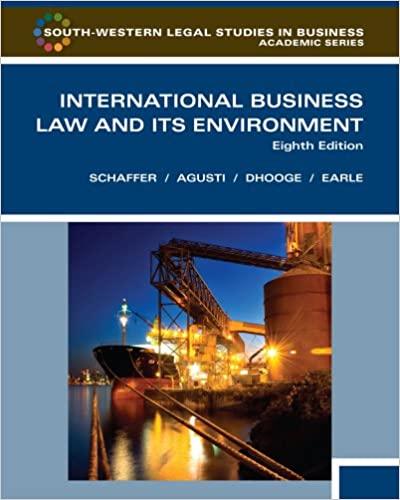Question
Corruption thrives in times of crisis and the ongoing global COVID-19 health crisis has created significant opportunities for corruption; for example, there has been documented
Corruption thrives in times of crisis and the ongoing global COVID-19 health crisis has created significant opportunities for corruption; for example, there has been documented corruption with respect to vaccines and supply chains for PPE and syringes.
As the global economy continues to develop, should the US revise its laws to be more in line with other democratic countries in regards to ethical business regulation? For example, in the last few years, the European Union (EU) has passed several new anti-corruption laws, though it has had mixed results particularly as to enforcement. In addition, the United Nations (UN) did adopt The United Nations Convention against Corruption (UNCAC) which is the only legally binding international anti-corruption multilateral treaty. The UNCAC covers many different forms of corruption, such as bribery, trading in influence, abuse of functions, and various acts of corruption in the private sector. UNCAC became effective in December 2005, but several UN countries have not signed it, and of those 140 that have, many countries have faced challenges in implementing and enforcing the UNCAC, calling into question its effectiveness in the global marketplace.
In June 2021, the UN held its first ever Special Session against Corruption in the General Assembly, UNGASS 2021, to address combating corruption in a post COVID-19 world. During the session, it was noted that approximately $2.6 trillion dollars is lost annually globally to corruption, often impacting developing nations and those who cannot afford to pay for goods and services (like vaccines). The UN member states adopted a political declaration against corruption on June 2, 2021. The declaration introduced only a few new commitments for states beyond those in UNCAC, and as many critics noted, fell far short of being a "roadmap" for global anti-corruption efforts. One of its greatest failings was that grand corruption - or high-level, large-scale corruption - was not addressed. This is not too surprising since the declaration was negotiated on a consensus basis.
If the US seeks to revise its laws to reflect more global standardization and uniformity in business and corruption laws, are we in effect lowering the bar to only what other countries will accept (like the UNGASS political declaration), or is there an opportunity to lead by example and press our values? Or, should we stay on our current path and keep our laws in place regardless of the global legal climate on corruption, or some hybrid approach?
Step by Step Solution
There are 3 Steps involved in it
Step: 1

Get Instant Access to Expert-Tailored Solutions
See step-by-step solutions with expert insights and AI powered tools for academic success
Step: 2

Step: 3

Ace Your Homework with AI
Get the answers you need in no time with our AI-driven, step-by-step assistance
Get Started


